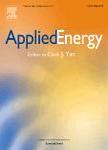版权所有:内蒙古大学图书馆 技术提供:维普资讯• 智图
内蒙古自治区呼和浩特市赛罕区大学西街235号 邮编: 010021

作者机构:Dalian Univ Technol Sch Infrastructure Engn Dept Civil Engn Dalian 116024 Peoples R China Anhui Jianzhu Univ Anhui Prov Key Lab Intelligent Bldg & Bldg Energy Hefei 230009 Peoples R China Cardiff Univ Sch Engn Cardiff Wales
出 版 物:《APPLIED ENERGY》 (Appl. Energy)
年 卷 期:2025年第378卷
核心收录:
学科分类:0820[工学-石油与天然气工程] 0817[工学-化学工程与技术] 08[工学] 0807[工学-动力工程及工程热物理]
基 金:National Natural Science Foundation of China [52408101, 52478080, 52078096] Open Foundation of Anhui Jianzhu University's Anhui Province Key Laboratory of Intelligent Building & Building Energy Saving [IBES2022KF04] Natural Science Foundation Joint Fund of Liaoning Province [2023-MSBA-023] The 2023 Dalian University of Technology-Cardiff University Cooperation and Exchange Foundation Project The 2023 International Exchange Foundation Project of "Co-Creation of Excellence Program" from Dalian University of Technology [DUTIO-ZG-202307] Key Project of DUT for International Students Studying and Researching in China: Innovation and Practice of Talent Cultivation Model in the Field of Smart Buildings for the "Belt and Road" Initiative [1103-82120001]
主 题:HVAC systems Collaborative optimization Computational efficiency Energy efficiency trade-off Multi-agent system
摘 要:The complexity of current optimization methods for HVAC systems is increasing, resulting in relatively lower computational efficiency, particularly in more complex systems. This difficulty makes real-time optimization and control challenging in practice. Therefore, there is an urgent need to simultaneously improve both system energy efficiency and computational efficiency to enhance system robustness. Present optimization methods predominantly emphasize enhancing system energy efficiency, often overlooking computational efficiency. Consequently, these methods become infeasible or unstable when implemented in practical systems. In our research, a multi-agent-based collaborative optimization method is proposed to solve the global optimization problem of complex HVAC systems. Under the multi-agent framework, the global optimization problem is decomposed into multiple sub-optimization problems considering the interaction characteristics among components, thus reducing the complexity of the global optimization problem in HVAC systems. The proposed AH-AFSA algorithm supports the solution of optimization problems containing hybrid decision variables (continuous and discrete variables) and can directly search for optimal discrete variables in the binary space. This feature is suitable for searching the optimal ON/OFF sequence and setpoints simultaneously during the global optimization process. The results demonstrate that the proposed method can save 18.9 % of electricity consumption with an average computing time of 12.2 s for each operating condition, saving about 54 % of the time cost compared to centralized methods. The methodology used in our research holds significant theoretical and practical value for enhancing the computational efficiency and productivity of optimization methods in complex HVAC systems.